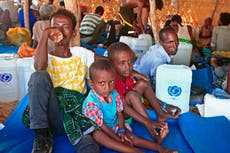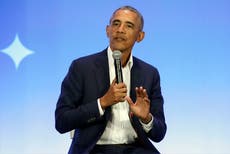As another laureate wages war, maybe it’s time we rethink the Nobel Peace Prize
When Trump was nominated for the prize, the world was aghast, but the crisis in Ethiopia has done little to provoke a conversation around the Nobel committee’s failings

Your support helps us to tell the story
From reproductive rights to climate change to Big Tech, The Independent is on the ground when the story is developing. Whether it's investigating the financials of Elon Musk's pro-Trump PAC or producing our latest documentary, 'The A Word', which shines a light on the American women fighting for reproductive rights, we know how important it is to parse out the facts from the messaging.
At such a critical moment in US history, we need reporters on the ground. Your donation allows us to keep sending journalists to speak to both sides of the story.
The Independent is trusted by Americans across the entire political spectrum. And unlike many other quality news outlets, we choose not to lock Americans out of our reporting and analysis with paywalls. We believe quality journalism should be available to everyone, paid for by those who can afford it.
Your support makes all the difference.Once again, a Nobel Peace laureate is presiding over an attack on its own citizens. Abiy Ahmed is waging a war against the powerful and defiant region of Tigray, forcing tens of thousands to flee the country and raising the spectre of a wider conflict in the restive Horn of Africa.
The Nobel committee’s pleas for peace have fallen on deaf ears, as the tanks roll in just one year after Ethiopia’s prime minister was handed the most prestigious prize of all.
At the time, the announcement that he had beaten then-favourites Greta Thunberg and Jacinda Ardern took much of the world by surprise.
The committee, despite criticism that they had rushed into a decision, lauded Adiy for his peace deal with Eritrea and his efforts “to achieve peace, international cooperation … and reconciliation”.
Fast forward to now and the country looks set for a civil war, which has the potential to spiral into a regional conflict. Hundreds have been killed, government forces are accused of targeting civilians – with the government having denied the allegation – and dangerous ethnic tensions ignited once again.
The speed at which Abiy has turned from peace broker to warmonger has been breathtaking – and it’s degrading the once revered prize.
When Trump was nominated for the prize, the world was aghast, but the crisis in Ethiopia has done little to provoke a conversation around the committee’s failings.
In showing a blatant disregard for the Nobel’s values of peace and reconciliation, Abiy has vowed a “final and crucial” war against his own people.
And yet he is not the first laureate to have civilian blood on their hands – few could have predicted the dramatic fall from grace of Aung San Suu Kyi, the once darling of international politicians.
A brutal army crackdown against the Muslim Rohingyas in Rakhine state drove over 700,000 to seek refuge in neighbouring Bangladesh, bringing reports of rape, expulsion, and mass murder (denied by the government).
Harrowing pictures of emaciated refugees shook the world, piling pressure on the “democracy activist” to take action.
Perhaps she was working within the system, some argued, desperately trying to appease a still powerful military that had kept her under house arrest for the best part of two decades.
But hopes that she would speak up for the persecuted minority, surely a basic prerequisite to get a Nobel, were quickly dashed during a notorious speech at the ICC.
Leading the Myanmar delegation she chose to deny accusations of genocide, defend the army, and, crucially, refuse to even utter the word “Rohingya”.
Barack Obama too, was awarded the prize in 2009 as US wars in Iraq and Afghanistan raged on.
Just 10 days before accepting the award, the then president announced the deployment of 30,000 more troops to Afghanistan.
He fully embraced drone warfare, authorising 10-times more airstrikes in the covert war on terror than his predecessor, George W Bush. This allowed him in public to maintain the well-crafted persona of a pacifist while, according to the Bureau of Investigative Journalism, hundreds of civilians were being killed in Pakistan, Somalia and Yemen.
The war in Yemen descended into what the UN has called the world’s worst humanitarian crisis, as US jets helped refuel and support the Saudi-led coalition’s war against Houthi militants.
Even Barack Obama admits to being taken aback by the announcement: “The idea that I, or anyone, could bring order to such chaos seemed laughable,” he wrote in his new memoir, A Promised Land.
It’s a legacy that has besmirched Nobel’s name, as awards hastily handed out as a reaction to in-vogue politics fail to stand the test of time.
Can the committee not do better? Even this year’s winner was wildly off the mark, overlooking the thousands of health workers worldwide risking their lives to save Covid-19 victims.
The prize, it seems, is too often awarded as a “good effort” sticker for politicians and, in focusing on a singular issue, ignores leaders’ critical failings in other policy areas.
As Obama quipped, “Whatever you do won’t be enough. Try anyway.”
It’s an embarrassment to the committee, and everything they claim to stand for, that they should have to come out publicly to implore one of their winners not to go to war.
Personally I am less outraged by Trump’s nomination, he was never going to win. But for those that do, perhaps we should now consider revoking honours for those who greenlight the murder of civilians.



Join our commenting forum
Join thought-provoking conversations, follow other Independent readers and see their replies
Comments